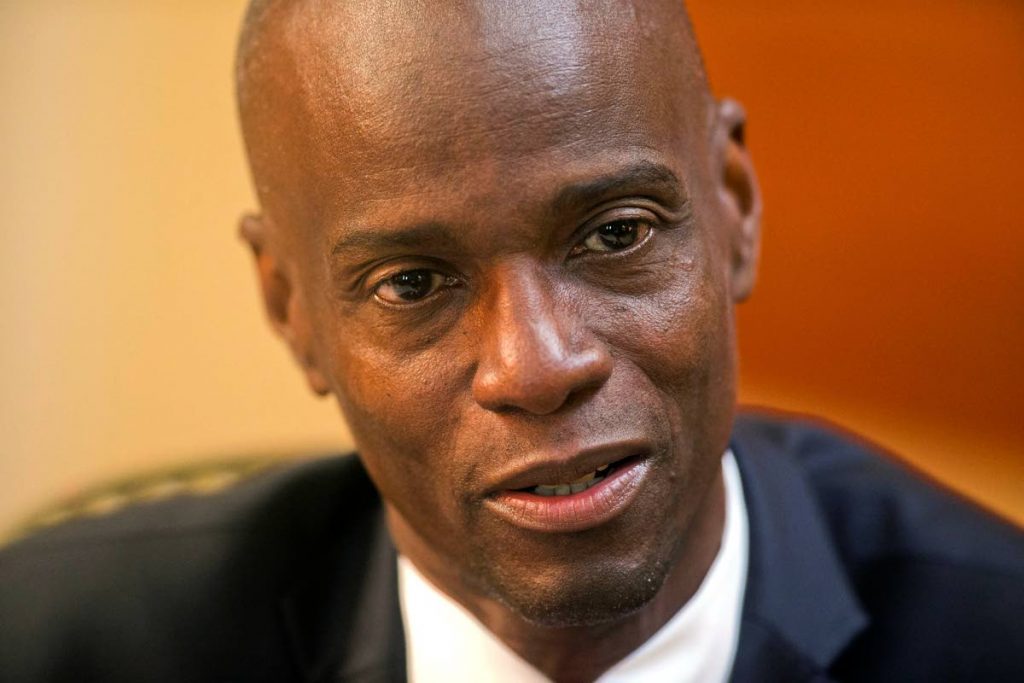Haiti, a crazy dream

It may be controversial, but my sentiments are always “poor Haiti'' or “poor Palestinians” whenever some item of tragedy or injustice concerning those two benighted countries is reported. Note: I intentionally describe Palestine as a country.
The time of the assassination last week of Haiti’s president Jovenel Moise may have coincided with my intense engagement with a programme on Al-Jazeera about the assassination of Khalil al-Wazir, better known as Abu Jihad, leader of the Palestininan military wing of the armed struggle, in Tunisia in 1988.
Media reports claim that US agencies believe Moise’s extrajudicial killing was a well orchestrated operation involving a highly trained and heavily armed group. It was so too when Mossad, the Israeli intelligence service, mounted a daredevil infiltration of the Al-Wazir’s home, having landed on a nearby Tunis beach under the cover of darkness. The precise and deadly operation had been planned for months, using an accurate replica of the layout of the house.
For 25 years Israel's role remained undetected, and it is still uncertain, but there is reason to believe Israel did not act alone, just as the men who were promptly killed by the police in Haiti on suspicion of Moise’s death definitely were not sole actors. Alas, Moise’s wife was injured, but Mrs Al-Wazir was carefully handled.
Of course, when I was a schoolchild Haiti was not a subject on the syllabus. We learned of the Haitian revolution en passant, and most of us only gained any knowledge of the most important event in the history of our region – the Haitian revolution – through fiction and advanced study.
The Black Jacobins by CLR James is the classic text. but it was not how I discovered Haiti. The popular and accomplished English novelist Graham Greene was an unexpected chronicler of our region, from his evocative 1960s fictionalisation of the actual 1920s-30s’ attempt to persecute the Catholic church in Mexico – The Power and the Glory – to his haunting The Comedians, about Haiti.
That novel was my introduction to Haiti’s unique and vivid culture and the depth of the corruption of the Papa Doc era. Greene’s writing and insights must be viewed through the prism of his Englishness.

Although there is a wealth of literature about the enormous achievement of Toussaint Louverture and the almost romanticisation of the Haitian revolution and the Haitian people, it is hard to suppress pessimistic feelings about Haiti’s trajectory. One misfortune follows another, whether it is hurricane, cholera, earthquake, environmental degradation, chronic poverty, coups d’etat, dictatorship and economic ruin, which all render it a failed state.
Last week’s developments have left the defiantly unstable country (it has been changing presidents on average every two years) with a deep political void, since political power was concentrated in the hands of Moise, who since 2019 had been ruling by decree, and security (or the lack of it) was in the hands of violent police and military leaders. These new events will deepen the impossibility of Haiti moving away from being the poorest country in our hemisphere, even though some Central American countries are trying to give it some competition.
There is an account in Sudhir Hazareesingh’s marvellous Black Spartacus: The Epic Life of Toussaint Louverture, of an exchange between Toussaint and a soldier whom he reprimanded for excessive bloodshed by saying, “Moué dit baliser, yo dessoucher même,” which means, “I told you to prune the tree, not uproot it,” to which the man replies, “Quand la pluie tombé, tout ça qui dehors mouillé” – "When rain falls everything outside gets wet." Simply said, violence begets violence.
I see a connection between Haiti’s birth and its present. We should remember that Haiti was forged from the love of liberty, but out of considerable bloodshed. It not only fought off the brutal and jealous imperial French power, but it got bogged down in what can only be described as a civil war between powerful characters, races and ideas. Toussaint tried to undo the effect of the bloodshed but he could not. It may be worth remembering, too, that Toussaint Louverture was the man behind the revolution, but not the man who ended it and declared the independent state of Haiti in 1804. That was his archrival Dessalines, after the exile and imprisonment of Toussaint and a disastrous period of French occupation. The violence continued with Dessalines eliminating all Toussaint’s supporters and allies and defying Toussaint’s dream of a multiracial republic.
Haiti, like all countries, is unfinished business, but unlike most, paying the price for freedom has been more painful, messy and difficult to overcome. According to Alfred Nemours in Histoire Militaire, the battle for independence involved a scorched-earth policy and the systematic destruction of the economy by grinding sugar production down to zero.
France’s notorious 200-year long demand for compensation with interest (calculated to total US$21 billion) all but killed off Haiti’s recovery, but the economy itself may be the least of Haiti’s challenges now. Overwriting its fraught political inheritance is the bigger barrier to Toussaint’s dream for the happiness of his people being realised.

Comments
"Haiti, a crazy dream"